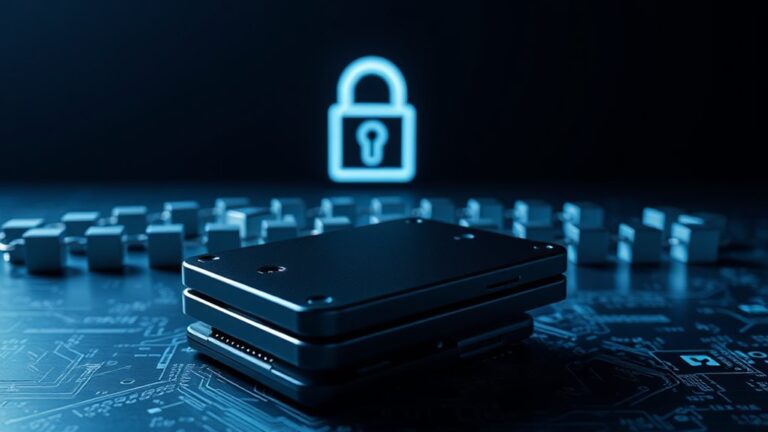How to Find Lost Crypto Wallets?
Note: This post may contain affiliate links, and we may earn a commission (with No additional cost for you) if you make a purchase via our link. See our disclosure for more info. The crypto world is constantly changing. This content is for informational purposes only and not financial, legal, or professional advice So, please verify the info on the cryptocurrency provider’s websites.
Finding a lost crypto wallet is like searching for buried treasure. First, rummage through old devices, emails, and documents for the all-important private key or seed phrase. Don't forget about cloud storage or password managers; there could be forgotten backups lurking there. Blockchain explorers might help track dormant wallets, and wallet forums are buzzing with tips from fellow users. If you're really desperate, data recovery software could be your last resort. Stick around for more tricks on this wild adventure.

Ever wondered what happens to all that crypto if a wallet goes missing? It's a nightmare scenario, isn't it? First things first, don't panic. You can try a few recovery steps. Check your old devices, emails, and documents. You might just stumble across that elusive private key or seed phrase.
Don't forget to rummage through your cloud storage or password manager. Who knows? You might find a backup hiding there, feeling all neglected.
Check your cloud storage or password manager; you might uncover a forgotten backup just waiting to be rediscovered.
You can also take a little stroll down memory lane using blockchain explorers. These nifty tools help identify dormant wallets and track those inactive addresses. If you're feeling particularly adventurous, explore wallet provider forums. A lot of people have been down this road and you might find a treasure trove of troubleshooting guidance waiting for you.
Now, if you still can't find a way in, recovery tools are your best friends. Data recovery software like Recuva or TestDisk might have your back, helping you retrieve deleted wallet files. It's important to remember that around 3 to 4 million Bitcoin are permanently lost due to forgotten private keys, emphasizing the need for thorough recovery efforts. Additionally, many users often overlook the importance of backups, which can make the recovery process significantly easier.
And if you manage to recover a wallet.dat file, you can import it into compatible software and voilà! But don't stop there. GitHub repositories have recovery scripts, and public lists of dormant addresses might just lead to a forgotten stash.
Seed phrases? They're the holy grail of wallet recovery. Without them, your funds are basically a mirage. Keep them offline and secure. Sharing them digitally? That's a hard pass. Misplacing them? Well, that's a one-way ticket to permanent loss. Remember that a proper seed phrase is generated from 2048 specific words that ensure both randomness and security for your crypto assets.
If all else fails, professional recovery services could be an option. Some specialize in cracking encrypted wallets. But let's be real—success rates are mixed. About half of recovered wallets end up empty.
And if your wallet was stolen? Brace yourself for some legal fun, likely involving blockchain forensics. It's a wild ride, but hey, at least it's not boring.
Frequently Asked Questions
Can I Recover a Wallet Without the Private Key?
Recovering a wallet without the private key? Good luck with that.
It's like trying to open a vault with no key. Sure, some might suggest contacting support or using fancy recovery services, but results are often dismal.
Without that golden key, options dwindle. Sure, you can rummage through old devices or cloud storage, but don't get your hopes up.
It's a tough road, and the odds? Not in your favor.
What Happens if I Forget My Wallet Password?
Forgetting a wallet password? Tough luck.
That's like misplacing the keys to a vault filled with cash. Without that password, the funds are stuck in digital limbo, forever inaccessible.
No magical help exists either; it's a decentralized nightmare. Sure, you could throw money at password cracking, but good luck with that $500-a-day bill.
Meanwhile, the Bitcoin just sits there, mocking you from the blockchain.
Lesson learned: remember your passwords, or lose it all.
Are Hardware Wallets Safer Than Software Wallets?
When it comes to safety, hardware wallets are generally the heavyweights. They keep your keys offline, away from hackers and phishing scams.
But hey, they're not exactly convenient. Need to make a quick trade? Good luck finding that device.
Software wallets? They're fast and user-friendly, but they're like leaving your front door wide open.
How Do I Secure My Crypto Wallet?
Securing a crypto wallet? It's not rocket science, but it's definitely not a walk in the park either.
First off, enable two-factor authentication. Seriously, it's like locking your front door.
Use strong passwords—no birthdays, please.
Store those seed phrases offline. Don't trust the cloud; it's a digital wild west out there.
And hey, stay away from public Wi-Fi. If a hacker can sniff your data, they will.
Simple, right?
What Should I Do if My Wallet Is Hacked?
When a wallet gets hacked, panic sets in.
First, transfer any remaining funds. It's like closing the barn door after the horse has bolted, but hey, better late than never.
Secure your devices—update that antivirus and change passwords.
Document everything; you'll need it.
And yes, filing a report with the FBI might feel dramatic, but it's necessary.
Don't forget to alert your exchanges, because they need to know your life's now a chaotic mess.










